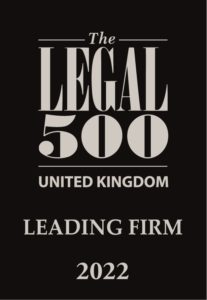We understand that contesting a will or disputes involving estates can be very difficult and upsetting, given that they will often follow a recent bereavement and may involve disagreements with family members.
Problems with the interpretation of a will, or disputes involving the administration of an estate or a trust, can also be very stressful for executors, trustees and beneficiaries.
Our experienced and dedicated legal team can help to take the stress out of these situations by resolving estate, trust or will disputes, whether by reaching an agreement with the other parties involved or by guiding you through any appropriate court action.
Who do we help with will, trust & estate disputes?
- Individuals
- Families
- Charities
- Executors
- Beneficiaries
- Trustees
- Deputies
- Attorneys
What can we help with?
Our specialist Disputed Wills, Trusts & Probate solicitors have extensive experience of managing and resolving complex will, probate and trust disputes, including:
- Contesting a will
- Inheritance Act claims
- Problems in the interpretation of wills and trust documents
- Disputes about charitable legacies
- Disputes between executors and beneficiaries
- Disputes between trustees and beneficiaries
- Disputing lifetime gifts
- Problems with estate administrations, including challenging costs and recovering debts
We can also assist you with disputes involving attorneys, deputies and Court of Protection applications.
Why choose us for disputing a will, trust or estate?
We understand that every client is unique and we will therefore always work in partnership with you in order to understand your concerns and achieve your goals.
We also have the expertise that you need to deal with disputes because we have nearly 20 years of experience specialising in will, trust and probate disputes. We can also provide specialist advice and support in relation to Court of Protection disputes.
Our aim is to provide you with support and clear advice, explain your options and protect your interests.
Costs
How much will a will, estate or trust dispute cost?
We understand that costs are an important factor in any legal dispute. We provide clear and transparent information about the costs involved in all types of will, trust Court of Protection and probate disputes.
Generally, costs in will, trust and estate disputes vary from case to case. This is because the level of costs incurred will usually depend upon the volume of work required and when and how the case is resolved.
To assist you to budget, we will discuss costs with you at the start of your case and give you costs information and estimates throughout.
Funding options
We provide clear and transparent information about the costs involved in all types of will, trust, Court of Protection and probate disputes.
We will give you regular costs estimates and updates to help you budget for your legal fees, from the start to the conclusion of your matter.
Work is usually charged at an hourly rate (where you will be billed monthly). Details of our hourly charge out rates will be contained in your letter of engagement.
Below are some alternative funding options that you may wish to consider. These may not be available in every case.
Fixed fee
We can offer fixed fee packages in respect of certain aspects of a claim, to provide you with the certainty of knowing exactly how much that work will cost.
Conditional Fee Agreement (CFA) – “No Win No Fee”
This is where a solicitor receives either no payment or a lower payment if the case is unsuccessful, but a normal or increased fee if the claim is successful.
Damages based agreements (DBA)
A solicitor is paid by way of a percentage of the damages received if the case is successful.
We consider CFAs & DBAs on a case by case basis. If you would like us to consider entering into a CFA or DBA, please note that we will undertake initial investigations into your claim, for which you will be charged at the relevant hourly rate. We will normally also require advice from a barrister as part of the process, the cost of which will be your responsibility.
Legal Expenses Insurance
You should check the terms of any insurance policies that you hold, for example, your household insurance, as the cover may include funding certain types of legal action. Such policies are known as ‘before the event’ insurance.
You may also wish to consider taking out an ‘after the event’ insurance policy, which usually provides cover for both your disbursements and your opponent’s costs in the event that your case is unsuccessful.
Litigation loans and third party funding
Litigation funding (also known as third party funding) is where a third party (with no prior connection to the litigation) agrees to finance all or part of the legal costs of the litigation, in return for a fee payable from the proceeds recovered by the funded litigant.
You may also be able to obtain a loan to cover your legal fees and expenses.
















